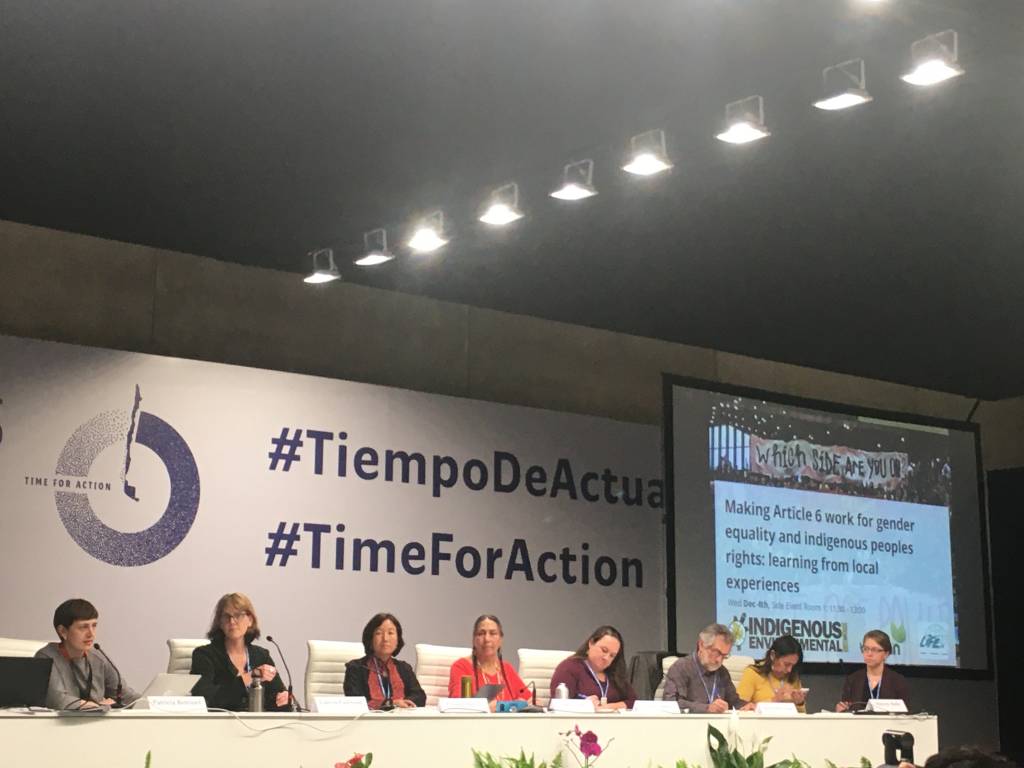
Indigenous women and frontline communities share stories at COP25 of defending against climate change in Nepal and Chile.
The United Nations Framework Convention on Climate Change (UNFCCC) began in March 1994. Today, it has near-universal membership. The 197 countries that have ratified the Convention are called Parties to the Convention. The ultimate objective of the Convention is to stabilize greenhouse gas concentrations “at a level that would prevent dangerous anthropogenic (human induced) interference with the climate system.” Such a level should be achieved within a time-frame sufficient to sustain that food production and economic development.[1]
What is the Conference of the Parties (COP)?
The COP is the decision-making body of the UNFCC. All States that are Parties to the Convention are represented at the COP gatherings, at which they review the implementation of the Convention and any other legal instruments that the COP adopts and take decisions necessary to promote the effective implementation of the Convention
History of the COP
The COP meets every year, unless the Parties decide otherwise. The first COP meeting was held in Berlin, Germany in March, 1995. The COP meets in Bonn, the seat of the secretariat, unless a Party offers to host the session. Just as the COP Presidency rotates among the five recognized UN regions – that is, Africa, Asia, Latin America and the Caribbean, Central and Eastern Europe and Western Europe and Others – there is a tendency for the venue of the COP to also shift among these groups.
Current COP
The Government of the United Arab Emirates (UAE) will host the 28th Conference of the Parties of the UNFCCC (COP 28), with a view to building on previous successes and paving the way for future ambition to effectively tackle the global challenge of climate change. COP28 will be the conclusion of the first global stocktake, an assessment or report card of how much progress has been made toward meeting the goals of the Paris Agreement. A preliminary report released earlier this year noted that efforts are falling short. Along with world leaders, many other people turn out for the annual event, including representatives from faith and environmental groups, scientists, business professionals and others who are concerned about humans’ impact on climate change.
COP and The PC(USA)
COP28 Stories
Global climate talks begin Nov. 30 in Dubai
Will world leaders at COP28 care for Creation?
COP28 Presidency unites the world on Loss and Damage (Press Release)
COP28 Unveiled: Uniting, Acting, and Delivering in Dubai
Climate Action Network Press Conference on Negotiations 12/1
WCC general secretary: “We have to speak up for justice”
Fossil fuel phase-out on the table at COP28
Loss and Damage in the Horn of Africa-a COP28 Reflection
Vulnerability and Climate Finance
Interfaith Liaison Committee call to COP28
COP28 Pledges So Far Not Enough to Limit Warming to 1.5C
Your Quick Guide To The Outcomes Of COP28
[1] https://unfccc.int/process-and-meetings/the-convention/what-is-the-united-nations-framework-convention-on-climate-change